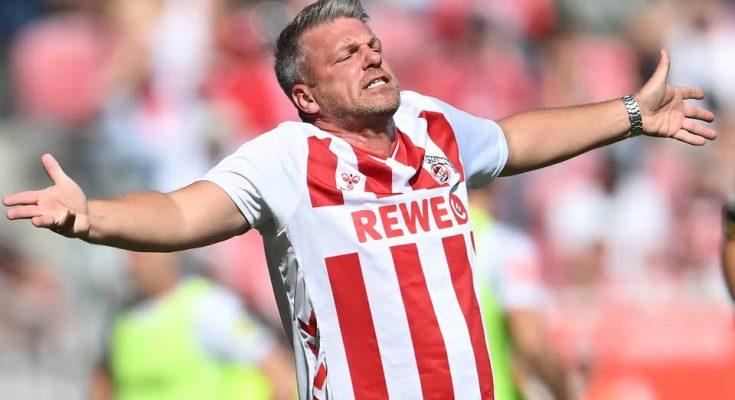The atmosphere around 1. FC Cologne has been tense for weeks, but the club reached a new breaking point after coach Lucas Kwasniok delivered a fiery and deeply unsettling outburst in the wake of the team’s latest defeat. What was supposed to be a routine post-match press conference turned into an extraordinary public explosion that left fans, players, and officials stunned. Instead of defending his side or offering measured analysis of their shortcomings, Kwasniok launched into a series of emotional and angry accusations aimed directly at his own squad. In an unprecedented move, he suggested that certain players might even be working against him, hinting at sabotage within the locker room.
The defeat that triggered this extraordinary reaction was painful enough in itself. Cologne, already struggling for consistency, suffered another blow that pushed them further down the Bundesliga standings. The fans, who had once embraced Kwasniok’s passionate and open manner, were expecting a rallying cry or at least an acknowledgment of their unwavering support in tough times. What they got instead was a verbal storm that shook the very foundations of the club. Kwasniok did not mince his words, claiming that the performance on the pitch was not just poor but deliberate, as if certain players had no intention of giving their best for the badge. Such an accusation is virtually unheard of in professional football, where even the harshest criticism is usually cloaked in diplomacy. But Kwasniok made no attempt to soften his message.
Observers in the room reported that his tone was a mix of fury and despair, the voice of a coach who felt betrayed by the very men he is tasked with leading. He called out a lack of fight, a lack of commitment, and even hinted that personal agendas were taking priority over the collective good. “I am no fool,” he is reported to have said. “I see what is happening out there. I see who runs and who doesn’t. And I can tell you, it’s not about ability—it’s about will. Some of these players are not with us. Some of them, I fear, are actively working against us.” The implication of sabotage struck like lightning, instantly setting off a storm of speculation about who he might be referring to and what exactly was happening behind closed doors.
For the players, the sting of these comments will be difficult to erase. Footballers are used to criticism; it is part of the job. But to be accused of sabotage by their own coach crosses a line that many would consider unforgivable. In the dressing room, trust between coach and squad is the lifeblood of success. Without it, tactics crumble, motivation wanes, and the collective spirit dissolves. By going public with such words, Kwasniok risks creating an irreparable rift. Some players may respond with renewed determination to prove him wrong, but others could withdraw, alienated by the suggestion that they are betrayers rather than professionals.
The timing of this blow-up could hardly be worse for Cologne. The season is entering a critical phase, and every point matters in the fight for survival and stability. Instead of uniting the squad to face the upcoming challenges, the coach’s tirade threatens to deepen divisions. Supporters who witnessed the press conference were left conflicted. On one hand, many admire Kwasniok’s honesty and his refusal to sugarcoat the situation. Cologne fans are famously passionate, and they despise excuses. They want commitment and fight, and Kwasniok voiced the frustrations they themselves have been shouting from the stands. On the other hand, by publicly humiliating his players, he risks alienating the very men who must deliver on the pitch. Fans may support the sentiment, but they also understand the dangerous precedent of a coach accusing his squad of sabotage.
Club officials now face an unenviable dilemma. Do they stand behind their embattled coach, hoping his firebrand approach will shock the players into a reaction? Or do they intervene, fearing that his words have crossed a professional boundary and could destabilize the entire season? Internal discussions are expected to intensify in the coming days, as Cologne cannot afford to drift into chaos. The specter of player revolts, fractured morale, and media scrutiny looms large. Every training session, every lineup decision, and every substitution will now be viewed through the lens of Kwasniok’s accusations.
It is important to understand why a coach would reach such an extreme point. Kwasniok, known for his tactical acumen and emotional presence, has long carried the burden of expectations at Cologne. He was seen as a figure who could inject both discipline and identity into the club. Early signs were promising, but as results turned sour, the weight of criticism began to mount. For a coach who thrives on connection and trust, repeated failures on the pitch must have felt like a betrayal. It is possible that in his desperation to shake the squad awake, he chose the nuclear option—public confrontation at its harshest. Yet such a method is a gamble that rarely pays off in modern football, where player power and dressing room unity can determine the fate of managers.
The players, meanwhile, are unlikely to remain silent. While no one has yet gone public to counter Kwasniok’s claims, leaks and whispers are bound to emerge. In professional football, accusations of sabotage carry serious implications not only for reputations but also for future careers. Any suggestion that a player deliberately underperformed or undermined his team could follow him long after leaving Cologne. It is expected that senior players, perhaps even the captain, will attempt to calm the situation, offering their own response in a bid to protect the squad’s honor.
The broader football world is watching closely, as Cologne’s crisis touches on universal themes of leadership, trust, and accountability. Can a coach truly motivate his team by accusing them of betrayal? Or does such a statement mark the beginning of the end for his tenure? Some pundits argue that Kwasniok’s comments reveal his passion and unwillingness to accept mediocrity. Others warn that he has lost control of his emotions and crossed into self-destructive territory. Comparisons are being drawn to infamous managerial meltdowns of the past, where public outbursts led to rapid downfalls.
Supporters of Kwasniok insist that drastic times call for drastic measures. They argue that if players truly are failing to give their all, the coach has a duty to expose them. Cologne, after all, is a club built on pride and resilience, and fans demand nothing less than total commitment. If Kwasniok’s accusations spark a reaction that leads to improved performances, then perhaps history will judge him as bold rather than reckless. But that is a massive “if,” dependent on a fragile human dynamic that can easily tip into collapse.
The players’ response on the pitch in the coming matches will be the ultimate test. If they fight with passion, run until the final whistle, and show unity, it might suggest that Kwasniok’s gamble worked, jolting them out of complacency. But if performances continue to falter, or if visible cracks appear in teamwork and communication, then the suspicion will grow that the coach has lost the dressing room. Once a manager is seen as isolated from his own squad, dismissal often follows swiftly.
The wider implications for the Bundesliga are also significant. Cologne has always been a club with a rich tradition and a fiery fanbase, and turmoil at such an institution sends ripples across German football. Rival fans may revel in Cologne’s crisis, but for neutrals, there is also a sense of unease. If a coach openly accuses his own players of sabotage, what does that say about the state of the modern game? Has the balance of power shifted so much that managers feel compelled to lash out in desperation? Or is this simply a case of one coach cracking under the strain of relentless pressure?
What cannot be denied is the drama and intensity of the moment. Lucas Kwasniok has lit a fire that will not easily be extinguished. His words have forced everyone connected to Cologne—players, fans, officials—to confront uncomfortable questions. Are the players truly giving their all? Is the coach still capable of leading them? Where does responsibility lie for the team’s failures? These are questions that will shape the coming weeks, both on and off the pitch.
As Cologne prepares for its next matches, the stakes could not be higher. Every result will be magnified, every gesture scrutinized. If Kwasniok remains in charge, he will face the daunting task of repairing the very trust he so publicly shattered. If the club decides his comments were a step too far, they may be forced into an early managerial change, plunging the team into further instability. Either way, the damage has been done. Cologne’s season, already hanging in the balance, has now been thrown into full-blown crisis by the coach’s own words.
In the end, the truth behind Kwasniok’s accusations may never be fully known. Were there truly players undermining the cause, or was this the emotional outpouring of a man under unbearable pressure? For the fans, what matters most is the future. They want to see their club fight with pride, unity, and passion. Whether that fight will be led by Lucas Kwasniok or someone else remains to be seen. What is certain is that this moment will be remembered as a turning point—one of the most explosive and controversial episodes in Cologne’s recent history, a night when the coach turned his fire inward and left an entire football city in shock.


